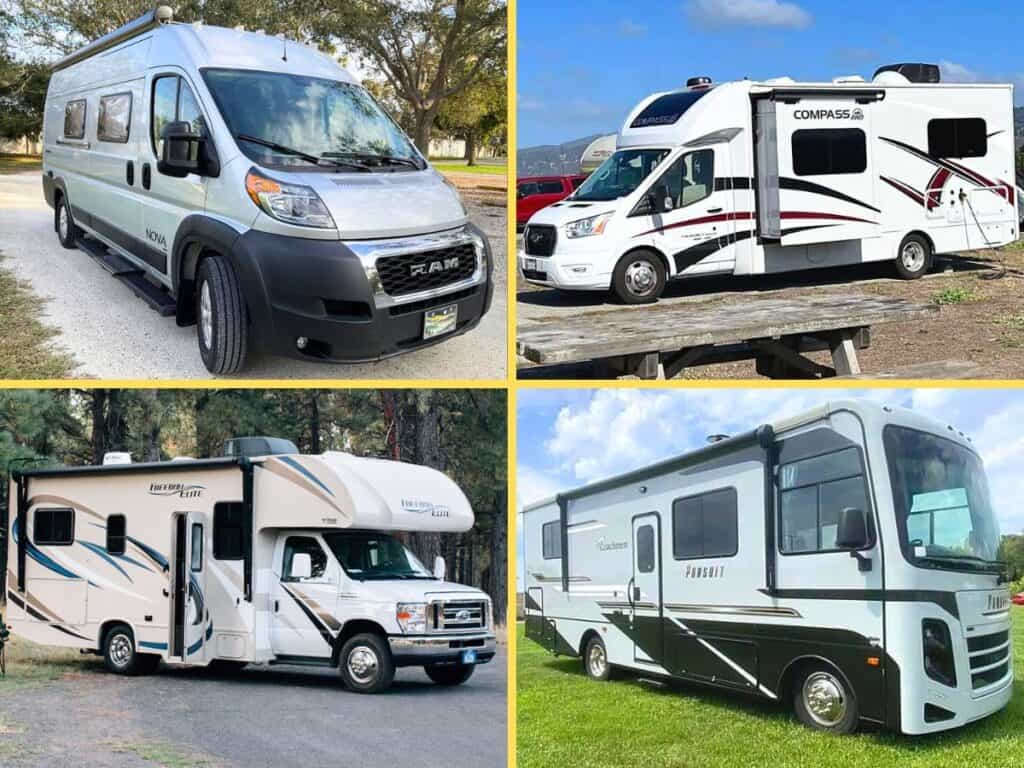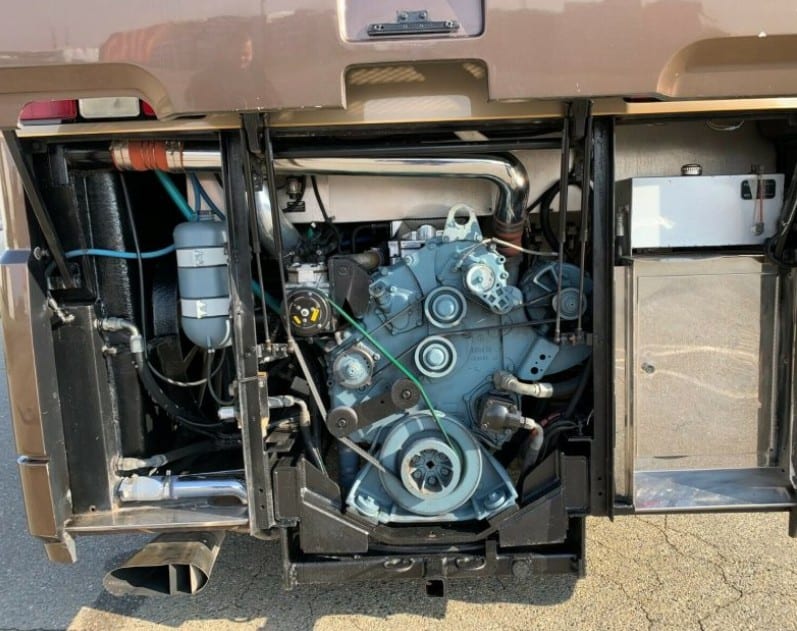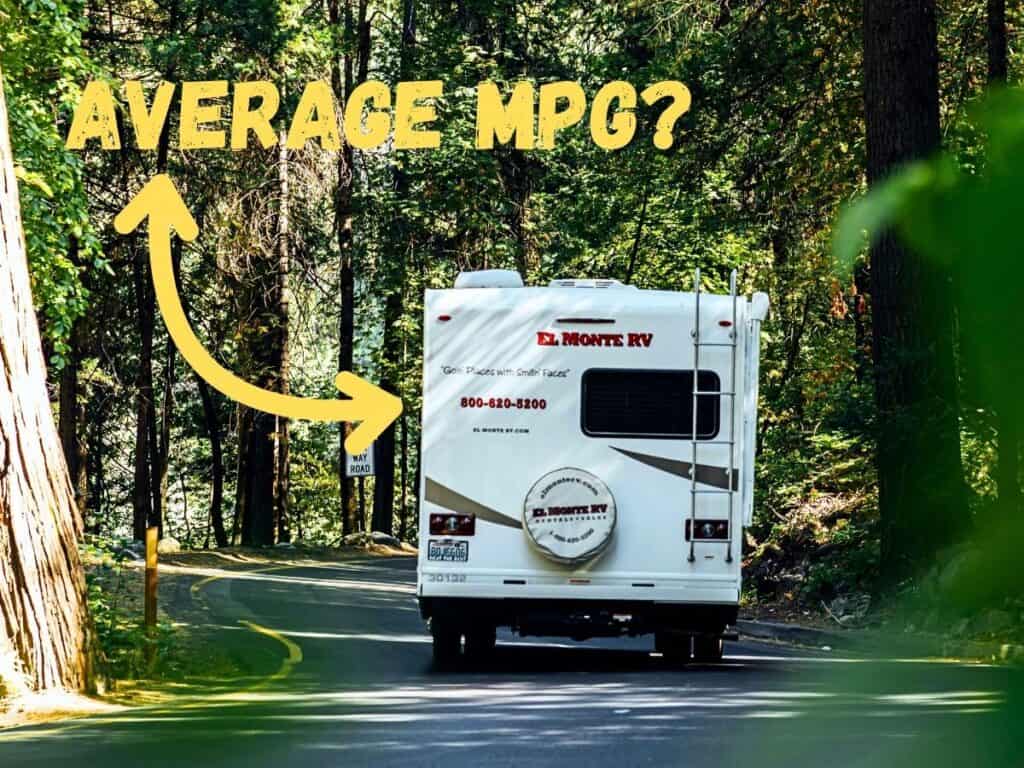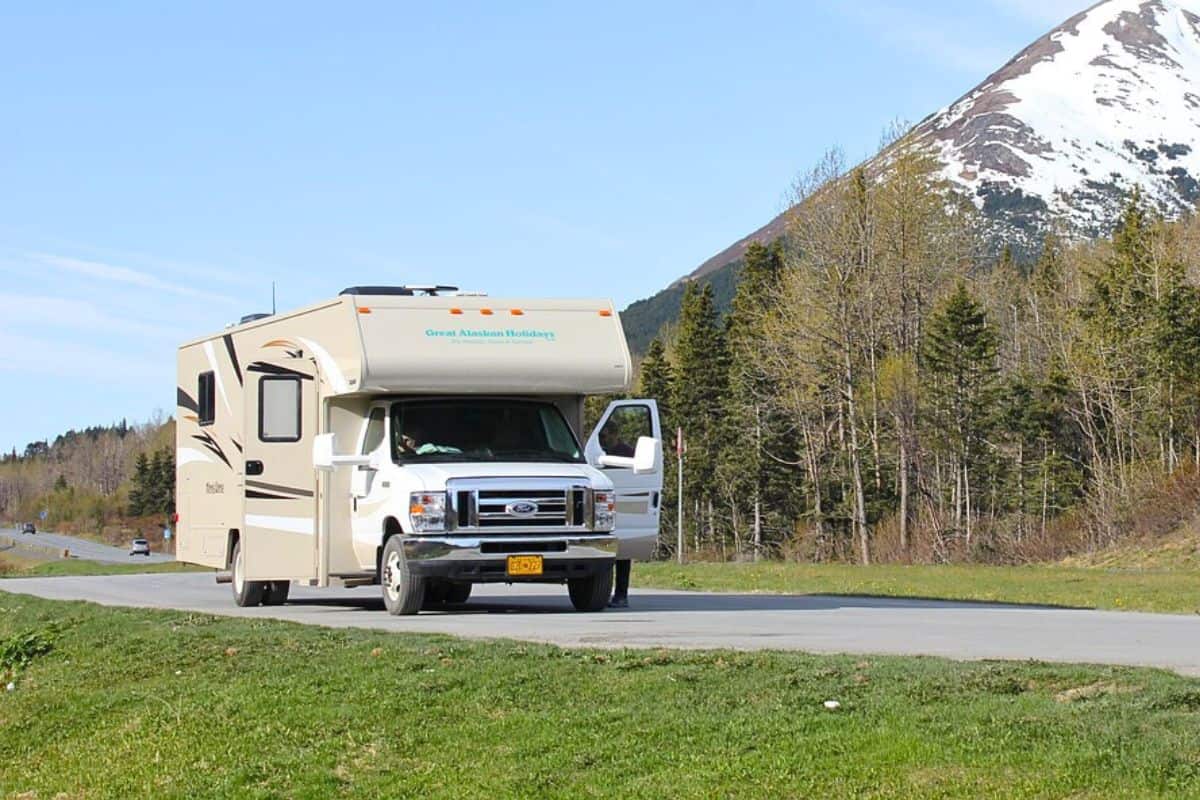Understanding RV fuel mileage gas vs diesel is essential when choosing your next motorhome.
Diesel RVs consistently outperform gas models when comparing fuel efficiency, delivering approximately 10% better fuel economy, thanks to diesel fuel’s higher energy density.
While actual mileage varies based on RV Class, length, and weight, diesel motorhomes typically achieve 10 to 16 MPG, compared to 8 to 12 MPG for gas-powered models.
Real Gas vs Diesel RV MPGs (Lowest to Highest)
| Make/Model/Trim | Type of RV | Fuel Type | Average MPG |
|---|---|---|---|
| Thor Motor Coach Chateau 31E | Class C | Gas | 8-10 |
| Jayco Redhawk 29XK | Class C | Gas | 9-10 |
| Entegra Coach Aspire 44R | Class A | Diesel | 9-10 |
| Newmar Ventana 3412 | Class A | Diesel | 9-10 |
| Forest River Forester 2441DS | Class C | Gas | 9-11 |
| Coachmen Freelander 27QB | Class C | Gas | 9-11 |
| Winnebago Minnie Winnie 22R | Class C | Gas | 9-11 |
| Fleetwood Discovery LXE 36HQ | Class A | Diesel | 10-12 |
| Tiffin Allegro RED 340 | Class A | Diesel | 10-12 |
| Winnebago Journey 34N | Class A | Diesel | 10-12 |
| Thor Motor Coach Sequence 20K | Class B | Gas | 13-15 |
| Tiffin Wayfarer 25RW | Class B+ | Diesel | 13-15 |
| Leisure Travel Vans Unity U24MB | Class B+ | Diesel | 13-15 |
| Thor Motor Coach Gemini 23TW | Class B+ | Diesel | 13-15 |
| Winnebago Navion 24D | Class B+ | Diesel | 14-16 |
| Roadtrek Zion | Class B | Gas | 14-16 |
| Winnebago Travato 59G | Class B | Gas | 14-16 |
| Coachmen Galleria 24FL | Class B | Diesel | 15-18 |
| Pleasure-Way Plateau TS | Class B | Diesel | 16-18 |
| Airstream Interstate 19 | Class B | Diesel | 16-18 |
RV Driving & Fuel Cost Beyond MPG
Fuel economy is just one piece of the puzzle, as there are many differences between Gas and Diesel RVs.
The rest of this RV MPG guide explores all the key differences, from maintenance costs to engine longevity, helping you determine which type of RV best suits your travel style and budget.

When it comes to miles per gallon diesel RVs are the clear winner, however, MPGs are not the only thing that matters when determining the actual cost of driving an RV.
Because while it’s true that diesel RVs get better miles per gallon, it’s also true that diesel fuel costs more compared to gasoline. The national average for a gallon of diesel fuel is $3.56 while a gallon of unleaded gasoline is $3.17. Making diesel fuel about 11% more expensive compared to gasoline.
This means, that while a diesel RV gets about 10% better fuel efficiency, it’s also true that diesel costs around 11% more than gasoline.
Gas vs Diesel Availability
Another factor to consider when deciding between a gas or diesel RV is how readily available the fuel is. While in the US it’s pretty easy to find gas or diesel, if you were to give a slight edge on availability, gas would be the winner.
Because while you can find diesel pretty much everywhere. Diesel fuel can sometimes be challenging to find in more remote areas. Whereas gasoline can pretty much be found anywhere.
Additional Diesel RV Costs
Another cost many people forget to consider when comparing the total fuel cost between a diesel RV and a gas RV is the added cost of DEF, which is required in all modern diesel engines.
If you are unfamiliar with DEF, it stands for Diesel Exhaust Fluid, a liquid used to reduce the amount of air pollution produced by a diesel engine. In the United States, as of 2010, the EPA requires all new diesel engines to use DEF.
So what does this mean?
Well, when you’re driving a diesel RV, for every 50 gallons of diesel used, approximately 1 gallon of DEF will be injected into the fuel mixture.
Meaning for every 50 gallons of diesel, you use, you will have the added cost of a $4 gallon of DEF.
It’s not all bad news with DEF though, because while it is an added cost, DEF does improve fuel efficiency, allowing a diesel engine to provide better MPGs.
Pros & Cons: Diesel vs Gas Class A Motorhomes
There are many design differences between gas and diesel Class A motorhomes that make a big impact on the overall comfort and enjoyability of each coach.
Gas Class A RVs
To begin with, on a Class A motorhome, the engine is upfront. This means you’ll need to talk a little louder in the front cab because you’ll be competing with the noise from the engine, which is sitting right under your feet, in what is called the dog house or engine cover.
In addition, in a gas Class A motorhome the generator is usually located in the back. This means, that if you’re running your generator at night when trying to sleep, it can be a little more challenging.
Unless you can find a way to treat the generator as a built-in white noise machine to help lull you asleep, as I do.
Diesel Class A RVs
In a diesel Class A motorhome, the engine is located in the rear, which is why they’re commonly called diesel pushers. The advantage of having the diesel engine in the back is that it’s much quieter when driving.
Also, another bonus to the diesel Class A RV design is that the generator is usually at the front of the motorhome. Because of this, when running the generator at night when trying to sleep it’s much quieter.
So when it comes to the design between a gas and diesel Class A RV, in my opinion, the diesel RV wins out.
RV Power: Diesel vs Gas
If you’re looking for more power and better uphill climbing capability, the diesel RV is the only way to go.
Diesel engines provide way more power, especially low in power, which is important when you’re trying to move a 20,000-pound RV up a hill. It’s more than just raw power though, because you also get a more robust transmission, better-towing capability, more torque, and better uphill acceleration.
Also, diesel RVs have an added safety feature, called engine break, which helps you come down hills and mountains easier and safer.
Finally, when it comes to power, the diesel RV just has more of it across the board compared to a gas RV, which also means that the diesel engine will have to work less hard when traveling down the road. This helps to extend the life of a diesel engine.
RV Purchase Price: Diesel vs Gas
If you’re looking to save money when buying an RV, gasoline models are the way to go, as a diesel RV will typically cost about 30% more compared to a gas model.
One thing to keep in mind though when looking at the cost between a diesel and gas RV is that the diesel engine will generally last longer. Because of this, diesel RVs hold their value better over time compared to gas RVs.
Diesel vs Gas RV Maintenance

There are both pros and cons with diesel and gas RVs when it comes to maintenance.
Diesel RV Maintenance Pros:
- A diesel engine can go longer without being serviced, usually 15,000 miles, allowing you to spend more time traveling and less time in the shop.
- Diesel engines have a long shelf life and can usually be driven many miles before running into costly repairs.
Diesel RV Maintenance Cons:
- It’s more expensive to work on a diesel engine compared to gasoline, due to higher hourly labor costs and the use of specialty tools.
- It can be harder to find places to work on your diesel RV, due to the specialized knowledge and tools needed to work on them.
Gas RV Maintenance Pros:
- Gas RVs are cheaper to work on leading to lower maintenance and repair bills when something goes wrong.
- Any repair shop can work on a gas engine.
Gas RV Maintenance Cons:
- Gas RVs require more routine maintenance, usually every 5,000 miles.
- Gas engines don’t last as long, which means you can run into substantial issues and costly repairs sooner.
Additional RV Resources:

- Class C RV Fuel Mileage: Real MPGs with 15 Examples
- Can a Class A RV Tow a Car? (Detailed Explanation)
- 10 Standard and Non-Standard Features on Class A RVs
- Is a Class A or Class C RV Bigger? (20 Examples)
Recent Posts
When cruising down the highway in your RV, the last thing you want is a tire blowout! Not only is it dangerous, but RV tire replacement isn't cheap, costing $200 to $300 per tire. The good news,...
Nothing ruins an RV adventure faster than a breakdown with no way to fix it. Because of this, every RVer should have a well-stocked RV tool kit for those unexpected roadside emergencies and campsite...

